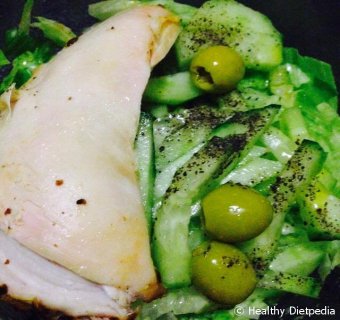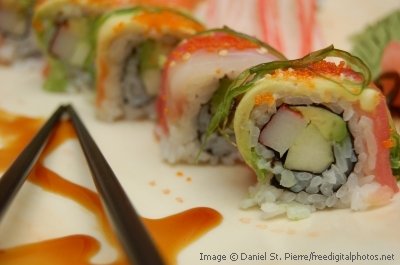Healthy Diet Plan › Healthy Eating Tips
Healthy Eating Tips
What Makes A Healthy Diet?
This article will provide you with the most important healthy eating tips. Here you will learn the basics of healthy nutrition and other key principles of a healthy weight loss diet plan.
These nutrition principles are aimed at providing you with essential knowledge on:
- how to choose nutritious diet food
- how to prepare it right
- how to consume it right
Of course, these healthy tips should not be an ultimate solution to your healthy weight loss diet.
However, if you follow these healthy eating tips you will be fit, happy and healthy for years to come. Keep in mind though that the environment and atmosphere play important part in developing and maintaining healthy lifestyle.
Healthy Eating Tips: Food
Proteins, Carbohydrates and Fats
To stay in shape our body needs a good balance of proteins, carbohydrates and fats.

Carbohydrates are main energy suppliers for our body. This energy is used immediately and is vital for healthy functioning of our internal organs. Carbs also help our body to form cells and tissue and even perform certain plasticity tasks.
Fats are concentrated long-term energy sources. They often thought to be harmful for our bodies. However they are very important for our well-being and health. Without them most internal processes, including those related to digestion, will slow down resulting in overall health decline.
Fats are also necessary for better absorption of beta-carotene and some vitamins. They play major role in temperature regulation. Lipid layer protects our palms and feet from injuries and helps to make our skin look fresh and glowing.
Protein are main building material for our body tissue. Most nutritionists and dietitians agree that optimal balance among fats, proteins and carbs should be 1.2/1/4. Based on 2200 diet it amounts to 66 grams of protein, 78 grams of fat and 318 grams of carbs.
Vitamins and minerals
Today we know thirteen main vitamins. Human body needs very small amounts of them. However, vitamin deficiency as well as overdose may lead to metabolic and hormonal misbalances. It may also affect our growth, development, immune, muscular, nervous and blood systems.
Healthy Eating Tips: It's Dinner time!
I know many women (and some men) who believe that it is healthy not to eat after 6pm.
It isn’t so.
Diet specialists agree that we should start our day with carbohydrates and finish with proteins.
Why? Because our body consumes energy during first half of the day and releases it during the second half (approximately after 4pm).
So carbohydrates supply us with much needed energy in the morning and proteins retain all internal processes under control in the evening and throughout the night helping our body to restore its used resource.
If you skip dinner you will end up starving your body, and therefore harming your health. And it definitely will not help you lose weight.
Water
It is a scientifically proven fact that the loss of a very small amount of water has a tremendous impact on our body.
When we lose 2% of body weight (about 16 oz of water) we get thirsty, when we lose 6-8% we get dizzy and weak, and if we lose more than that we may lose our life.
It is easy to calculate how much water we need per day: for every pound of our body weight we need about half an ounce of water.
So if you weigh 130 pounds you will need approximately half a gallon of water. But make sure you don’t drink too much water as it may dilute your blood causing faster kidneys and cardiovascular system burnout.
Foods to avoid
Foods that carry the least amount or none of healthy nutrients should be consumed in small quantities or if possible be excluded from a healthy diet altogether.
This includes smoked, cured meats and fish, canned food (except for vegetables), coffee, black tea, soda, including diet soda, candy, sweets, sugar, white rice, bleached flour and mayonnaise.
Of course almost everyone will find something he can’t live without from the above list. And that’s ok.
For example, I love coffee and will not stop drinking it any time soon. However, I only have one cup a day, as oppose to four I had before. And what is more: I drink it black – no sugar, no cream, no donuts :)
If drinking diet coke makes you happy, don’t torture yourself – have it, just limit the quantity. After some time you might even find a better, healthier substitute, but take your time. Unbearable food cravings are more damaging to your health than bad food consumed in reasonable quantities.
Food that makes you healthy
Here is the good news: you still have plenty of delicious healthy food left to choose from. All kind of vegetables, fruits, grains, mushrooms, fish, eggs, beans, grains, lean meats, seafood, low-fat dairy products, nuts, seeds, honey, olive oil and even butter.
Believe me, with this many choices you will never get bored eating!
Why the taste is important?
I think that this is one of the most important healthy eating tips. It is crucial that you should like and enjoy what you eat. Scientists proved that our system will reflectively refuse to digest and absorb poor tasting, unpleasant food.
In other words if you can’t stand the taste of broccoli – do not eat it, even if you know that it is very good for you. Your body will use up all the good nutrients received from it to fight the stress you had to go though to swallow them.
But what if all you like is cake and candy? Good question.
I was in that situation once. And I would like to share my personal healthy eating tip with you. I mixed healthy food that did not taste good with something that I really liked.
Gradually, I was getting used to the flavor of healthy food and increasing its quantity. At the same time I was cutting down on other ingredients, so that ultimately all that was left on my plate was healthy, nutritious food.
It took me months or with certain foods even years – but the result was very satisfying!
Exotic Foods
It may look very attractive and tempting but at the same time it may hide many unpleasant surprises to our digestive system.
Over the years our bodies got used to certain foods and process them fast and easy. But if we suddenly introduce something new and exotic our digestive tract may get fussy because it lacks the appropriate enzymes to break down molecules of alien food.
That is why you should avoid consuming large quantities of unusual food or go on a strict exotic diet.
Thermal Effect
Ideally temperature of the food in your plate should be roughly the same as your body temperature. It will not be absorbed easily if it is too hot or cold. But if you want to boost your metabolism drink your water cold as it requires energy which equals to more calories burned to bring the temperature up.
Healthy Eating Tips: Cooking
Think fried? Think again!
The best food is uncooked, raw or minimally processed food. It contains most vitamins and minerals. If you boil, or bake it – it will still retain some of the nutrients. But frying kills it all.
Cooking Atmosphere
If you ask a good chef what is his secret ingredient, most likely he will answer - love! Your emotions are important in the kitchen. If you are sad or stressed out your food will absorb that mood and will come out tasteless or even toxic.
On the other hand – positive emotions contribute to quality of the food and healthy diet. That is why you should enjoy cooking your meals as much as you enjoy eating them.
Reheated Leftovers
Do you like microwaved food? Probably not. And that is not a surprise, since it is not just bland but also unhealthy.
Dietologists recommend eating food right after cooking. If you wait longer, or decide to leave your dinner for tomorrow lunch it will loose almost all healthy nutrients and will be useless. It may also become good environment for bacteria growth.
Constant consumption of reheated meals may weaken your stomach, liver and immune system. As a result you may start feeling sleepy, tired and have difficulty concentrating. So try to eat your food fresh.
Cook smaller meals that will not ‘live’ in your refrigerator for days or even weeks.
Raw Food Diet

Perhaps you haven’t heard of this term yet, but raw foodismbecomes more popular in western cultures. It is a lifestyle philosophy promoting consumption of raw or minimally processed food.
The heating temperature should not be higher than 115°F.
'Raw foodists' claim that such food retains maximum nutrients and other ferments that improve our health.
Although scientist have not proved that this way of living is healthy, i decided to include raw food diet principles to my healthy eating tips, because it may give some of you a new healthy cooking perspective.
Healthy Eating Tips: Eating
Stay on Schedule
Your body loves predictability. It will appreciate if you eat at the same time every day.
Eat when you are hungry
Easier said than done, right? Well, there are some guideline that may help you distinguish real hunger from uncontrollable appetite.
First of all, the food that you ate should go through the whole digestion cycle before you need to refuel your system again. It takes from two to four hours, depending on what you have eaten. (Proteins, fats, or carbs – remember?)
So give your stomach a break for about three hours.
Secondly, if you start feeling hungry, use this tip: eat only after you have thought about food for three times.
And last: you should leave the table feeling a little hungry (not too much though) – this will help you to ensure that you haven’t overeaten.
"For me the hardest part was to stop eating after I have started. :) To get my craving under control I used this simple ‘psychological trick’: I waited fifteen to twenty minutes before eating again and usually (well 95 percent of the time) this feeling was gone. Use this healthy eating tip whenever you can't control your appetite - it works! "
Chew it up!
Remember ‘don’t-talk-while-you-eat’ saying? :) It is indeed quite important to chew your food up well. Your stomach will definitely say ‘thank you’ if he gets well broken down food ready for digestion. And you will never feel heavy in your stomach again.
Here is a simple healthy eating tip: chew your food till you distinguish its flavor – and swallow it up after flavor disappears.
Eating sequence that make a healthy diet
There are some simple food order guidelines: eat raw and liquid food first and then proceed with steamed, boiled or baked. Leave the fattiest for last. Consequently eat cold food first and warm last. Yes - soup for appetizer, steak for main course.
One day fasting
Simply drinking water or fresh juices for one day of the month will clean up and regenerate your gastrointestinal tract and make you feel especially good.
Of course you should consult with your physician before starting any diet, including one day weight loss juice fasting.
Healthy Eating Tips: Last but not least
Don’t starve yourself if you are trying to lose weight. If you constantly feel hungry and think about food all the time – you may get a nervous breakdown. Stress does not make a diet healthy; instead it may lead to weight increase.








